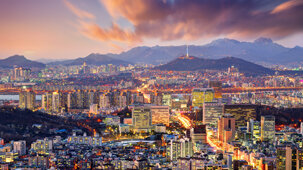Best Climate Change Law Lawyers in Seoul
Share your needs with us, get contacted by law firms.
Free. Takes 2 min.
List of the best lawyers in Seoul, South Korea
About Climate Change Law in Seoul, South Korea
Climate Change Law in Seoul, South Korea refers to the collection of national and local legal frameworks designed to address the challenges presented by global warming and environmental degradation. It encompasses regulations that target reducing greenhouse gas emissions, promoting renewable energy, increasing energy efficiency, and supporting environmentally friendly urban development. As the capital and largest city in South Korea, Seoul plays a critical role in the country’s efforts to meet local and international climate commitments, making it an epicenter for legal developments and enforcement related to climate change policies.
Why You May Need a Lawyer
Engaging a lawyer specializing in Climate Change Law can be invaluable in several situations. Common reasons include interpreting complex climate-related regulations for businesses, resolving disputes pertaining to emissions limits or penalties, challenging or responding to government enforcement actions, navigating environmental impact assessments for development projects, and ensuring compliance with both local and international climate obligations. Legal counsel can also assist in understanding and applying for subsidies or incentives for green projects, defending against claims of environmental harm, and contributing to policy advocacy or public interest litigation to strengthen environmental protection measures.
Local Laws Overview
South Korea has enacted a range of climate-related laws, most notably the Framework Act on Carbon Neutrality and Green Growth, which sets a roadmap for carbon neutrality by 2050. Seoul, as a city, supplements these national policies with local ordinances, such as the Seoul Metropolitan Government's climate action plans. These involve mandatory greenhouse gas reduction targets, public disclosure of emissions for large emitters, and the implementation of restrictions on high-emitting vehicles within the city. Other relevant laws govern construction standards for buildings, waste management, renewable energy incentives, and corporate responsibilities for supply chain emissions. Understanding the interplay between national legislation and Seoul’s municipal rules is essential for compliance.
Frequently Asked Questions
What is the main climate change law in South Korea?
The primary law is the Framework Act on Carbon Neutrality and Green Growth. It establishes the legal basis for achieving carbon neutrality by 2050 and sets mandatory greenhouse gas reduction targets.
How does Seoul enforce climate change regulations locally?
Seoul enforces climate change regulations through city ordinances, penalties for non-compliance, and specific climate action programs targeting sectors such as transportation, construction, and energy use.
Are businesses in Seoul required to report their greenhouse gas emissions?
Yes, large businesses and some specific industries are required to monitor and publicly report their greenhouse gas emissions, as part of efforts to enhance transparency and accountability.
What are the penalties for violating climate change regulations?
Penalties can include administrative fines, operating restrictions, or orders to suspend activities, depending on the severity and nature of the violation.
Can individuals or organizations participate in policy-making or litigation?
Yes, public participation is encouraged. Individuals and organizations may provide input during public consultations, and public interest litigation regarding climate change issues is growing in Seoul and nationwide.
What incentives are offered for renewable energy adoption in Seoul?
The government provides subsidies, tax benefits, and preferential loans for installing solar panels, energy-efficient appliances, and other renewable energy solutions in homes and businesses.
How does climate change law affect new construction projects?
New construction projects must comply with strict environmental impact assessment requirements, building codes focused on energy efficiency, and sometimes green building certifications.
Is climate change law the same across South Korea?
While national laws set the foundation, local governments like Seoul have additional regulations and initiatives tailored to local needs and challenges.
Can foreign companies operating in Seoul be subject to local climate regulations?
Yes, all businesses operating within Seoul, including foreign companies, must adhere to relevant local and national climate change laws.
Where can I get more information about compliance requirements?
You can consult the Ministry of Environment, the Korea Environment Corporation, or seek legal advice from lawyers specialized in environmental and climate change law for guidance specific to your situation.
Additional Resources
- Ministry of Environment (MOE) of South Korea provides information on laws, policy updates, and compliance guidance.
- Seoul Metropolitan Government's Environmental Policy Office manages local ordinances and climate action plans.
- Korea Environment Corporation (K-eco) offers support with emissions reporting and green certification.
- Non-governmental organizations such as the Korea Federation for Environmental Movements offer community resources and advocacy information.
Next Steps
If you suspect you may need legal guidance regarding climate change law in Seoul, consider the following steps. First, identify the specific issue or regulatory requirement relevant to your situation. Gather any pertinent documents or communications from government authorities. Next, conduct a preliminary review of national and Seoul-specific regulations. For detailed interpretation or in the case of a dispute, consult with a qualified lawyer who specializes in environmental or climate change law. Many law firms in Seoul offer free initial consultations or can guide you to the right resources. Taking informed, timely action will help ensure compliance and minimize risk, whether you are an individual, a business, or a non-governmental organization.
Lawzana helps you find the best lawyers and law firms in Seoul through a curated and pre-screened list of qualified legal professionals. Our platform offers rankings and detailed profiles of attorneys and law firms, allowing you to compare based on practice areas, including Climate Change Law, experience, and client feedback.
Each profile includes a description of the firm's areas of practice, client reviews, team members and partners, year of establishment, spoken languages, office locations, contact information, social media presence, and any published articles or resources. Most firms on our platform speak English and are experienced in both local and international legal matters.
Get a quote from top-rated law firms in Seoul, South Korea — quickly, securely, and without unnecessary hassle.
Disclaimer:
The information provided on this page is for general informational purposes only and does not constitute legal advice. While we strive to ensure the accuracy and relevance of the content, legal information may change over time, and interpretations of the law can vary. You should always consult with a qualified legal professional for advice specific to your situation.
We disclaim all liability for actions taken or not taken based on the content of this page. If you believe any information is incorrect or outdated, please contact us, and we will review and update it where appropriate.















